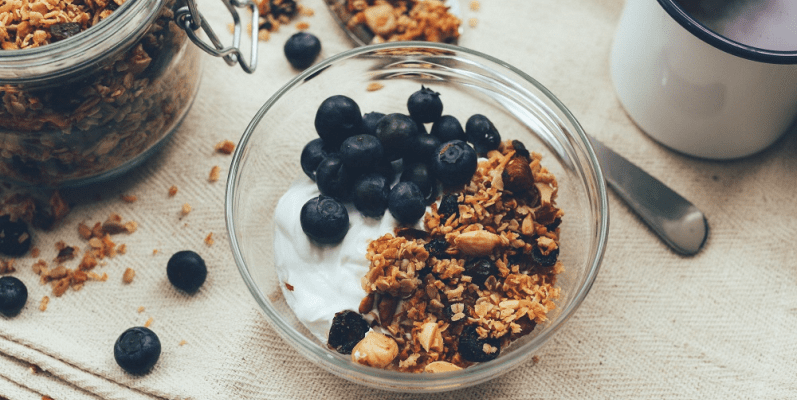You have probably heard that age-old saying, “breakfast is the most important meal of the day.” But, when is the best time of the day to actually have this meal, and what if you don’t have a typical 9-to-5 routine?
Breakfast literally means “breaking the fast” and is traditionally the first meal eaten in the day. Eating breakfast has been associated with helping people get the nutrients they need in a day, improve their ability to learn and focus, and help reduce overeating later in the day. However, there is no straight-forward answer as to when you should eat breakfast. Depending on what you do for work or what time of day you choose to exercise, the amounts and timing of breakfast can be different from one person to the next.
Scenario 1: The “typical” 9 AM to 5 PM workday
Typically, we encourage people to eat within 2 hours of getting up, or at the latest, by 9 AM. Ideally a balanced breakfast contains a grain/starch, source of protein, milk (or milk alternative) and a fruit. An easy idea is a nut butter and banana wrap with 1 cup of milk on the side. If breakfast is new to you, start with 2 food groups and gradually build to a complete, balanced breakfast.
Scenario 2: The early morning workout
If working out early in the morning is part of your weekly routine, you may need to take a different approach for breakfast. Ideally, try to have a source of grain/starch and protein prior to working out. Since you have been fasting for several hours, it is important to replete depleted glycogen stores prior to pushing your body in a workout. For example, having 1 slice of bread with peanut butter or 1/2 cup of flavoured Greek yogurt 30-60 minutes prior to your workout and enjoying the rest of your breakfast afterward is a great place to start.
Scenario 3: The night shift worker
In this case, your “breakfast” may be at 1 PM after a night shift. This doesn’t need to be a traditional breakfast meal but could instead be leftovers and more closely resemble lunch. Ideally, it is best for you to get right back into a regular schedule in order to normalize your body’s circadian rhythm. For example, you may choose to have leftover rice, veggies, and chicken. It will be important that you make time to have your main meal before heading off to work and continue in a routine eating pattern for the remainder of your day.
No matter when breakfast works into your schedule, it is important to fuel up on the right balance of protein, milk or alternative, whole grains, and some fruits or vegetables. A Registered Dietitian can help customize your meal needs and timing based on your specific lifestyle and workout routine.
Resources:
- https://abbylangernutrition.com/ask-the-dietitian-what-do-i-eat-for-breakfast/
- https://www.worksafe.qld.gov.au/__data/assets/pdf_file/0009/109773/shifting-nutrition.pdf



